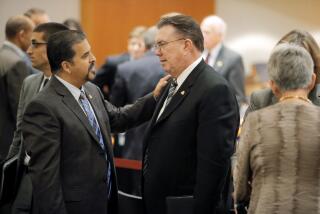City Council Meets to Eat and Taxpayers Pick Up the Tab in Whittier
- Share via
WHITTIER — Once or twice a month, the City Council adjourns its meeting as the Redevelopment Agency and heads for a private dinner at Reuben’s, the Whittier Hilton or some other local restaurant.
The five council members are joined by two top city administrators and charge the meal to the taxpayers at an average cost of about $100, according to city records.
Then the group heads back to City Hall for the evening’s regular City Council meeting.
The dinners, which council members insist are strictly social, have been a tradition for at least the last eight years.
But if city business has ever been discussed, the council has violated the Ralph M. Brown Act, a state public meeting law that prohibits any quorum of a legislative body from meeting privately to consider matters in its jurisdiction, Whittier City Atty. Robert Flandrick said.
Flandrick, who said he did not know about the dinners, declined to comment on the specific habits of the council. But Flandrick said he would advise any public official that in the case of a potential public meeting violation “if the appearance is given the damage is done. You better take remedial action, it seems to me.”
Although current city officials say business has never been discussed over dinner, one former council member recalled last week that at one gathering in 1984, she was pressured to support a $1-million city subsidy which provided land for the 206-room Hilton, one of the largest projects in city history.
Sabina Schwab, who retired from the council in 1988 after two four-year terms, said she was seated across the table from an official of the development company that was trying to put together the Hilton deal.
“It was pretty point-blank,” said Schwab, the only council member to oppose construction of the $14-million project. “He wanted to know, ‘Why don’t you feel Whittier needs a hotel and why are you voting no?’ ”
City Manager Thomas G. Mauk said he could not remember that meeting. “It was so long ago,” Mauk said. “I wouldn’t have any recollection of that.”
Mayor Victor A. Lopez, who was on the council at the time of the Hilton decision, said he does not recall the council ever having dinner with any developer.
Mauk said it was “ludicrous” to suggest that the dinner meetings are improper. “There’s nothing in the Brown Act that says the council can’t go to dinner together,” he said.
However, the California attorney general’s office has cautioned against holding such meetings.
“An informal conference or caucus permits crystallization of secret decisions to a point just short of ceremonial acceptance,” the 1980 opinion said. “There is rarely any purpose to a nonpublic pre-meeting conference except to conduct some part of the decisional process behind closed doors.”
Lopez defended the dinner gatherings and said he was not troubled by the appearance of a private meeting preceding a public meeting.
“The integrity of the council is such that I don’t have any problem with it,” Lopez said.
Asked what the council members discuss during dinner, Lopez said, “Women, the weather, football games--you name it.”
Mauk and several council members said the dinner discussions sometimes include talk of “what’s going on around town,” but never city policy matters. Councilman Thomas K. Sawyer said Mauk sometimes updates the council on city business, but no decisions are made.
Sawyer said the dinners are more a matter of convenience than anything else, since council members sometimes have as little as an hour in which to eat before the council meeting starts at 7:30 p.m.
“It doesn’t bother me,” Sawyer said.
After the dinner at which the Hilton deal was discussed, Schwab said she often avoided the gatherings. Instead, she went home to eat or to the library to read.
“I never approved of those meetings,” Schwab said. “It’s terrible. It’s like flaunting that ‘We’re all buddy-buddy and we’re a nice cohesive unit.’ ”
Schwab also said that taxpayers should not be paying for the meals, but current council members disagree. In the last year, the dinners cost Whittier taxpayers about $2,000, City Clerk Gertrude Hill said.
Lopez said the council is underpaid, at a salary of about $6,000 a year for part-time service, and deserves a free meal once in a while. After spending the afternoon preparing for a council meeting, he said, “if the city picks up my tab for dinner I have no problem with that.”
The Whittier Planning Commission also has had two private dinner meetings in the last several months, the most recent of which preceded a public hearing last week on the city’s most controversial issue: whether to limit apartment construction north of the Uptown business district.
In the middle of a Planning Commission meeting that started at 4 p.m., a secretary reminded the commissioners that “you have a 5:45 dinner reservation at the Hilton.”
Planning Commissioner Larry Haendiges said he sees nothing wrong with the meetings, because the commissioners do not discuss city business. But he acknowledged that having private meetings contributes to the idea that public officials cut deals before casting their votes in the public light.
“With us, nothing is decided before the meeting,” Haendiges said.
More to Read
Sign up for Essential California
The most important California stories and recommendations in your inbox every morning.
You may occasionally receive promotional content from the Los Angeles Times.













